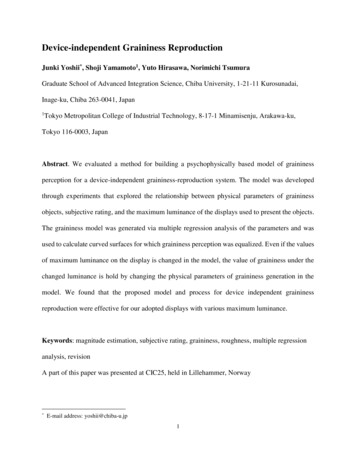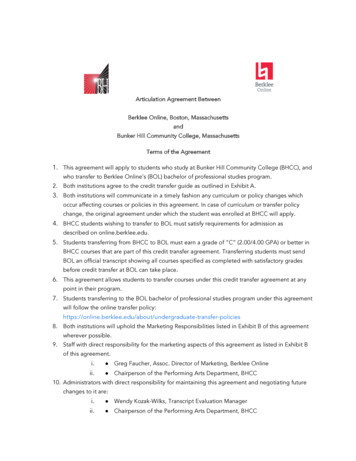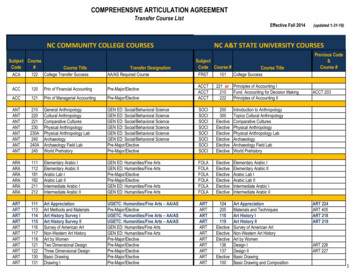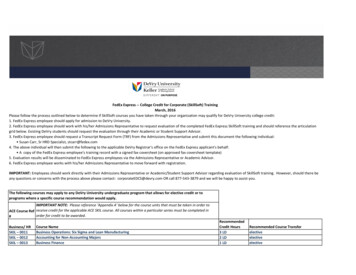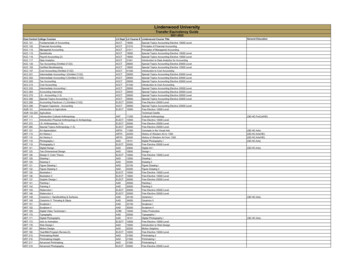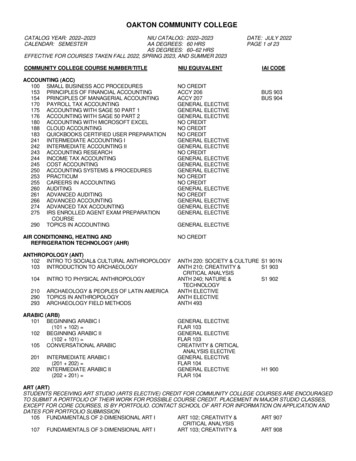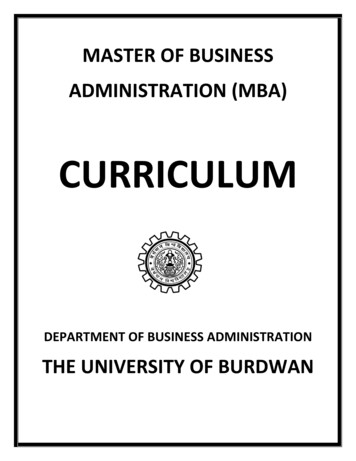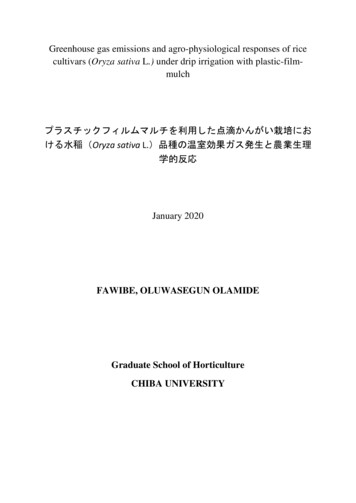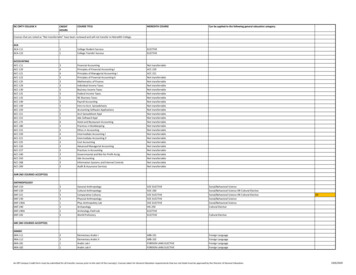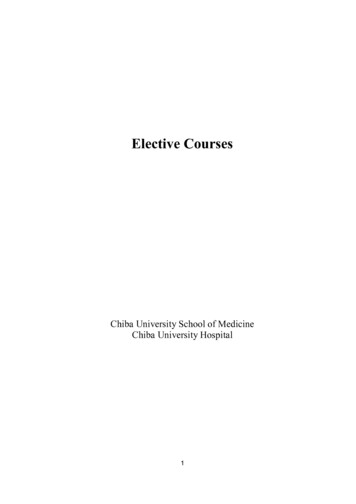
Transcription
Elective CoursesChiba University School of MedicineChiba University Hospital1
Table of ContentsGASTROENTEROLOGY . 3DIABETES, ENDOCRINOLOGY AND METABOLISM . 4HEMATOLOGY . 5ALLERGY AND CLINICAL IMMUNOLOGY. 6CARDIOLOGY. 7PULMONARY MEDICINE. 8NEUROLOGY. 9PEDIATRICS. 10GENERAL MEDICINE . 11PHYSICAL MEDICINE AND REHABILITATION . 12PSYCHIATRY. 13EMERGENCY AND CRITICAL CARE MEDICINE . 14GENERAL SURGERY. 15ESOPHAGO-GASTRO-INTESTINAL SURGERY . 16GENERAL THORACIC SURGERY . 17CARDIOVASCULAR SURGERY . 18OBSTETRICS & GYNECOLOGY. 19ORTHOPEDIC SURGERY. 20OTORHINOLARYNGOLOGY. 21NEUROSURGERY. 22UROLOGY . 23OPHTHALMOLOGY. 24DERMATOLOGY . 25PLASTIC AND RECONSTRUCTIVE SURGERY . 26PEDIATRIC SURGERY. 27RADIOLOGY . 28ANESTHESIOLOGY AND PALLIATIVE CARE MEDICINE . 29DENTISTRY AND ORAL SURGERY . 30SURGICAL PATHOLOGY . 31OCCUPATIONAL AND ENVIRONMENTAL MEDICINE. 32MOLECULAR DIAGNOSIS, CLINICAL GENETICS AND PROTEOMICS . 332
GASTROENTEROLOGYNumber of studentsaccepted: 2Length: 4 WeeksPrerequisiteStudent must have completed an M3 clerkship.PurposeTo provide students an excellent experience of the contemporary gastroenterologicalpractice in Japan, including endoscopic examination and treatment (gastrointestinal tract ,biliary and pancreas), treatment of hepatitis, interventional procedure of hepatocellularcarcinoma, and related research.CompetenciesStudents will be expected to gain a better understanding of gastroenterological diseases andpatient care.Instructional featuresThe students will participate in the care of gastroenterology patients both in the hospitaland in the clinic setting. They will participate in the interventional procedure andpost-procedure care. They will be assigned to selected inpatients and have a presentation ontheir patients at conferences. The course allows the student to function as a junior houseofficer.AssessmentThe students will be evaluated by mini-clinical evaluation exercise(mini-CEX, "CCsnapshot"), portfolio, case reports, oral examination,and clinical performance examination(CPX). Each will be measured by five Likert scale.Administrative informationProgram director: O. Yokosuka yokosukao@faculty.chiba-u.jpRequirementsNight Call: NoWeekends: NoHourly breakdown per weekLectures/Conferences/Faculty contact: 4Laboratory: 2Outpatient 4Inpatient: 30Total hours/week 40Key words3
DIABETES, ENDOCRINOLOGY AND METABOLISMNumber of studentsaccepted: 1Length: 4 WeeksPrerequisiteStudents must have completed M3 Medicine Core Clerkship.PurposeThis elective provides opportunity for students to learn the common and the rare endocrineand metabolic disorders.Competencies To learn managements of type 1 and type 2 diabetes, and complications of diabetesTo learn to treat dyslipidemia and metabolic syndromeTo learn to narrow the differential diagnosis of adrenal tumors and pituitary tumorsTo learn to diagnose disorders of fluid and electrolyte metabolismTo learn to manage hyperthyroidism, hypothyroidism, and the thyroid nodulesTo expand knowledge about Werner syndrome (also known as “Adult progeria”), a very rare,autosomal recessive disorderInstructional featuresThe student participates in hospital and outpatient clinic, patient evaluation, ward rounds,conferences, journal clubs, seminars in close association with, and guided by the attendings,residents, graduate students, and faculties in diabetes, endocrinology and metabolism. She/he isgiven responsibility in evaluating and managing patients, literature review, and presenting materialat the conference and journal clubs. Optional programs include adrenal venous sampling,ultrasound examination of the thyroid and the carotid artery. The research areas available includebasic science research in the areas of diabetes, lipid metabolisms, bone biology, tumors (especiallytumor suppressor gene p53), and geriatrics.AssessmentThe students will be evaluated by mini-clinical evaluation exercise(mini-CEX, "CCsnapshot"), portfolio, case reports, oral examination,and clinical performance examination(CPX). Each will be measured by five Likert scale.Administrative informationProgram Director: Koutaro Yokote, M.D., Ph.D. (kyokote@faculty.chiba-u.jp)Administrator: Tomoaki Tanaka, M.D., Ph.D. (tomoaki@restaff.chiba-u.jp); PHS: 72080Phone: 043-226-2092 (department office)RequirementsNight Call: NoWeekends: NoHourly breakdown per weekLectures/Conferences/Faculty Contact: 5Laboratory: 0-2Independent Study: 3-5Outpatient: 10Inpatient: 20Total Hours /Week: 40Key wordsDiabetes, Endocrinology, Geriatric Medicine4
HEMATOLOGYNumber of studentsaccepted: 2Length: 4 WeeksPrerequisiteStudents must have completed M3 Medicine Core Clerkship.PurposeThis elective provides opportunity for students to learn recent advance in hematologicaldiseases and stem cell transplantation.CompetenciesThe aim of the course is to perform and understand the following:・Good physical examination and presentation・The process of treatment decision of hematological diseases・How to treat acute leukemia (AML, ALL) and lymphoma by chemotherapy・How to apply molecular targeting therapies to leukemia, lymphoma and myeloma・How to manage patients after allogeneic stem cell transplantation・The recent advances of novel agents in multiple myelomaInstructional featuresThe students are expected to be an active participant in stem cell transplantation unit,outpatient clinic, ward rounds, conferences, journal clubs, and seminars. All schedules areclosely supervised by attending physicians, residents, graduate students, and faculties in theDepartment of Hematology, and the Department of Transfusion Medicine and CellTherapy. The students are given responsibilities in evaluating and managing patients,literature review, and presenting materials at the conferences and journal clubs.AssessmentThe students will be evaluated by mini-clinical evaluation exercise(mini-CEX, "CCsnapshot"), portfolio, case reports, oral examination,and clinical performance examination(CPX). Each will be measured by five Likert scale.Administrative informationLocation: 7th floor, east wing (inpatient’s ward), 1st floor (outpatient’s ward)Program Director: C. Nakaseko, M.D., Ph.D. (chiaki-nakaseko@faculty.chiba-u.jp)Administrative Director: C Ohwada, MD. PhD. (chikako ohwada@faculty.chiba-u.jp)RequirementsNight Call: NoWeekends: NoHourly breakdown per weekLectures/Conferences/Faculty Contact: 5Laboratory: 0-2Independent Study: 3-5Outpatient: 10Inpatient: 20Total Hours /Week: 40Key wordsHematology, Anemia, AML, ALL, Lymphoma, Myeloma, Stem cell transplantation5
ALLERGY AND CLINICAL IMMUNOLOGYNumber of studentsaccepted: 2Length: 4 WeeksPrerequisiteStudents must have completed the M3 Core Clerkship in MedicinePurposeThis clinical elective program will provide the students with experience in the diagnosis and themanagements of a spectrum of both allergic and rheumatic diseasesUpon completion, the students should;1. Be able to identify, diagnose, and treat common allergic or rheumatic diseases.2. Be able to understand basic concepts in Immunology and pharmacology as they pertain toclinical care.CompetenciesIt is the mission of this elective to provide students a solid foundation in Rheumatology andAllergy. This will train them to be physicians who will approach the patient with musculoskeletaland allergic complaints in an organized, efficient and professional manner; who will continuelife-long learning in the subspecialties of rheumatology and allergy which will enhance theirknowledge base; and will enhance their communication and interpersonal skills as they relate to thesubspecialties.Instructional featuresThe students will participate in clinical conferences, and observe and assist medical care in aninpatient and outpatient setting. In addition to patient contact, several preceptorial sessions areheld during the elective. These seminars cover allergic and rheumatic diseases in depth andemphasize disease mechanisms as well as diagnostic and therapeutic aspects. During the 4-weekperiod, students have ample time for independent reading. Students work closely with faculty andstaff of the Division of Rheumatology throughout the 4-week elective.AssessmentThe students will be evaluated by mini-clinical evaluation exercise(mini-CEX, "CCsnapshot"), portfolio, case reports, oral examination,and clinical performance examination(CPX). Each will be measured by five Likert scale.Administrative informationProgram Director: Hiroshi Nakajima, MD, PhDProfessor of the DepartmentRequirementsNight Call: NoWeekends: NoHourly breakdown per weekLectures/Conferences/Faculty contact: 10Laboratory: 4Outpatient 6Inpatient: 12-18Key wordsautoimmunity,allergy,rheumatology,clinical immunology6
CARDIOLOGYNumber of studentsaccepted: 1Length: 4 WeeksPrerequisiteStudents must have completed their M3 Core clerkships in Medicine.PurposeTo provide the student advanced clinical experience in cardiology, and cardiovascularimaging.CompetenciesAt the end of the course, the student is expected to: Perform a good cardiovascular examination; Understand cardiac anatomy and physiology and how it applies to the clinical setting; Interpret electrocardiograms, echocardiograms, coronary angiograms, and other cardiac images; Manage patients with the following cardiovascular conditions: a) Coronary artery disease; b)Heart failure; c) Valvular heart disease; d) Cardiac arrhythmia.Instructional featuresThe student will participate in the care of cardiology patients on the inpatient service. The cardiovascularphysical examination skills will be taught at bedside. Additionally, the student will gain experience in each ofthe following areas week by week accompanied by experts: Non-invasive testing including echocardiography (transthoracic and transesophageal), exercise/dobutamineechocardiography, exercise stress testing, nuclear cardiology, cardiac MRI, positron emission tomography,and ultrafast CT scanning; Interventional cardiology procedures including cardiac catheterization, coronary angioplasty, percutaneousrotablator therapy, coronary stenting, and intravasucular ultrasound; Cardiac electrophysiology, including indications, diagnostic electrophysiology studies, ablative techniques,and pacemaker and defibrillator placement.AssessmentThe students will be evaluated by mini-clinical evaluation exercise(mini-CEX, "CCsnapshot"), portfolio, case reports, oral examination,and clinical performance examination(CPX). Each will be measured by five Likert scale.Administrative informationProgram Director: Y. Kobayashi (Professor)Attending: Y. Iwata (Assistant professor)yoiwata-chiba@umin.orgRequirementsNight Calls: OptionalWeekends: OptionalHourly breakdown per weekInpatient: 10Imaging / Catheter Laboratories: 15Outpatient / ER: 10Lectures/Conferences/Faculty contact: 5Total hours/week 40Key wordsCardiology, ECG, echocardiography, coronary intervention, electrophysiology7
PULMONARY MEDICINENumber of studentsaccepted: 6Length: 2 WeeksPrerequisiteStudents must have completed the M3 Core Clerkship in Medicine.PurposeThe students will be expected to realize diagnosis and management of patients who are requiredhospitalization for respiratory diseases such as acute exacerbation of COPD, pneumonia, pulmonaryhypertension, lung cancer, status asthmaticus, interstitial lung disease and acute respiratory failure,et al. The student will have hospital exposure to many pulmonary illnesses along with ventilatorcare, laboratory diagnostics modalities which include chest X-rays, computed tomography scans,pulmonary function tests, bronchoscopies and thoracentesis. Experience in the outpatient clinicdealing with common pulmonary diseases will also be available.Competencies Basic interpretation of chest X-rays and computed tomography scans of the lung. Interpretation of pulmonary function tests Basic understanding of respiratory failure Understanding pathophysiology and treatment of respiratory diseases, including lung cancer,asthma, COPD, pulmonary hypertension, interstitial lung disease and pleural effusion, et al.Instructional featuresThe student will be involved in direct patient care, seeing new consults, making daily rounds oncurrent patients, seeing brochoscopies, thoracenteses, and pulmonary function testing. They willround with the pulmonologists, discussing each in-patient and be asked to make short (5 -10minute) presentations on various pulmonary topics.AssessmentThe students will be evaluated by mini-clinical evaluation exercise(mini-CEX, "CCsnapshot"), portfolio, case reports, oral examination,and clinical performance examination(CPX). Each will be measured by five Likert scale.Administrative informationProgram Director: S. Sakao and K. TatsumiRequirementsNight Call: NoWeekends: NoHourly breakdown per weekLectures/Conferences/Faculty Contact: 10Outpatient: 2Laboratory/Independent Study: 6Inpatient: 22Total Hours /Week: 40Key wordsPulmonary Disease, Pulmonary Function Testing, Exercise Testing, Bronchoscopy.8
NEUROLOGYNumber of studentsaccepted: 2Length: 4 WeeksPrerequisiteStudents must have completed their M3 Core clerkships in Medicine, Pediatrics, andSurgery.PurposeThe objective of this program is to give the student advanced clinical experience inneurology, neurophysiology, neuroimmunology, and neuroimaging beyond the requiredspecialty rotation.CompetenciesAdvanced neurologic diagnosis and management with clinical-anatomic-radiologiccorrelation, and electrodiagnostic-clinical correlation.Instructional featuresThe student will participate in the care of neurology patients on the neurology inpatientservice, as well as consult services at outpatient clinics at Chiba University Hospital.She/he will have the responsibility of performing neurological examination, andparticipating in the plan for care along with the resident and attending. Optional programsinclude neuroimaging courses (reading MRI, CT, and SPECT) and clinicalneurophysiologic testing (nerve conduction study, EMG, and evoked potentials). Shortlectures may be available for representative neuroimmunological diseases (multiplesclerosis, Guillain-Barre syndrome, and myasthenia gravis), focusing on regionaldifferences in the clinical features, pathophysiology, and treatment between the USA andJapan.AssessmentThe students will be evaluated by mini-clinical evaluation exercise(mini-CEX, "CCsnapshot"), portfolio, case reports, oral examination,and clinical performance examination(CPX). Each will be measured by five Likert scale.Administrative informationProgram Director: S. Kuwabara kuwabara-s@faculty.chiba-u.jpDepartment of NeurologyRequirementsNight Call: NoWeekends: OptionalHourly breakdown per weekLectures/Conferences/Faculty contact: 10Laboratory: 2Outpatient 8Inpatient: 20Total hours/week 40Key wordsAdvanced neurology, diagnosis and management, clinical-anatomic correlation,neuroimaging, clinical neurophysiology9
PEDIATRICSNumber of studentsaccepted: 2Length: 4 WeeksPrerequisiteStudents must have completed their M3 Core clerkships in Medicine and Pediatrics.PurposeThe objective of this program is to give the student advanced clinical experience withdisease of neonates, infants, children, and adolescents, as well as with normal infants andchildren. Normal processes of growth and development are emphasized. The studentsmust understand the diseases of children based on age-related physical, psychological,social background.Competencies(1) Understand normal growth and development from neonatal period through adolescence.(2) Experience with a wide variety of acute and chronic inpatient pediatric cases.(3) Identify and assess clinical and socioeconomic problems in pediatric patients.(4) Improve case presentations and discussion on ward rounds and at conferences.Instructional featuresThe student will participate in the care of pediatric patients on the inpatient serviceincluding NICU, as well as consult services at outpatient clinics at Chiba UniversityHospital. She/he will have the responsibility of participating in the plan for care alongwith the resident, chief and attending. The student will round with the team and attendgeneral pediatric conferences.AssessmentThe students will be evaluated by mini-clinical evaluation exercise(mini-CEX, "CCsnapshot"), portfolio, case reports, oral examination,and clinical performance examination(CPX). Each will be measured by five Likert scale.Administrative informationProgram Director: Prof. Yoichi Kohno, MD, PhD kohnoy@faculty.chiba-u.jpRequirementsNight Call: NoHourly breakdown per weekLectures/Conferences/Faculty contact: 10Laboratory: 2Outpatient 8Inpatient: 20Weekends: OptionalTotal hours/week 40Key wordsPediatric medicine, comprehensive care, neonates, infants, children, adolescents10
GENERAL MEDICINENumber of studentsaccepted: 1Length: 2 weeksPrerequisiteStudents must have completed their M3 Core clerkships.PurposeTo learn the principles of clinical problem solving and ambulatory medicine.CompetenciesAt the end of the course, the student is expected to:1) understand the proper assessment and management of an underdiagnosed symptom andhealth problem of a patient using a comprehensive approach to address all biopsychosocialproblems without being restricted to an organ system or disease.2) understand the importance of medical interview, which can independently facilitatedefinitive diagnosis of a majority of disease or illness.Instructional featuresThe student will observe how a senior resident examines a patient with an underdiagnosedsymptom, discuss the patient’s health problems with the senior resident and attendingphysician, confirm the patient’s diagnosis, and develop management plans.AssessmentThe students will be evaluated by mini-clinical evaluation exercise(mini-CEX, "CCsnapshot"), portfolio, case reports, oral examination,and clinical performance examination(CPX). Each will be measured by five Likert scale.Administrative informationProgram Director: M. Ikusaka e-mail: chiba u soshin@mac.comDepartment of General MedicineRequirementsNight call: NoWeekends: NoHourly breakdown per weekOutpatient: 30Lecture/Conference/Faculty contact: 10Total hours/week: 40Key wordsClinical problem solving, ambulatory medicine11
PHYSICAL MEDICINE AND REHABILITATIONNumber of studentsaccepted: 1Length: 1 WeeksPrerequisiteStudents must have completed their M3 Core clerkships in Medicine and Surgery.PurposeThe rehabilitation electives provide students an experience of the physical medicine andrehabilitation in general hospital.CompetenciesInstructional featuresThe student will participate in functional evaluation of patients.AssessmentThe students will be evaluated by mini-clinical evaluation exercise(mini-CEX, "CCsnapshot"), portfolio, case reports, oral examination,and clinical performance examination(CPX). Each will be measured by five Likert scale.Administrative informationRequirementsNight Call: NoHourly breakdown per weekLectures/Conferences/Faculty contact: 1Laboratory: 0OutpatientInpatient (consultation): 2Weekends: NoTotal hours/week 24Key words12
PSYCHIATRYNumber of studentsaccepted: 2Length: 4 WeeksPrerequisiteStudents must have completed their M3 Core clerkship in Medicine, Pediatrics, andSurgery.PurposeThe objective of this program is to give the student advanced clinical experience in clinicalpsychiatry, psychiatric medicine, neurobiology, clinical psychology, psychotherapy, orrelated region of mental health science beyond the required specialty rotation.CompetenciesAdvanced psychiatric diagnosis and treatment with evidence based bio-psycho-sociomultidimensional model.Instructional featuresThe student will participate in the care of patients with mental disorder on the psychiatryinpatient and/or outpatient service at Chiba University Hospital. She/he will haveresponsibility of performing clinical interview with patients and family, clinical assessmentincluding some of rating scale, general examination, neuroimaging (brain CT, MRI,SPECT) and so on. Therapeutic approaches with cognitive behavioral therapy and/or otherpsychotherapy for inpatient are available. Attending to lectures and Clinical & ResearchMeetings are recommended.AssessmentThe students will be evaluated by mini-clinical evaluation exercise(mini-CEX, "CCsnapshot"), portfolio, case reports, oral examination,and clinical performance examination(CPX). Each will be measured by five Likert scale.Administrative informationProgram Director: M. Iyo; iyom@faculty.chiba-u.jpRequirementsNight Call: OptionalHourly breakdown per weekLectures 2Conference 6Laboratory 2Outpatient 8Weekends: OptionalInpatient 20Outreach Service 2Total hours/ week 40Key wordsPsychiatry, neurobiology, evidence based medicine, cognitive behavioral therapy, clinicalresearch13
EMERGENCY AND CRITICAL CARE MEDICINENumber of studentsaccepted: 2Length: 4 WeeksPrerequisiteStudents must have completed all M3 core clerkships.PurposeTo help the student understand the mechanism of development of critical illness.To recognize any organ system failures as they present in the critically ill patients.To provide exposure to the various diagnostic, monitoring, and therapeutic methods used inthe management of critically ill patients.CompetenciesStudents will be expected to gain a better understanding of emergency and critical carediseases and patient care as well as cutting-edge of scientific research in critical care fields.Instructional featuresThe students will participate in morning and evening conferences, intensive care unit (ICU)rounds, journal club, morbidity and mortality conferences, research conferences, and otheracademic activities. In twice daily ICU conferences in the ICU, each patient will bepresented. The critical illness, other underlying diseases, and methods of monitoring willbe discussed. Potential complications, their recognition and management will be explained.The students will also observe treatments for the patients at the Emergency Department.The students will be able to experience some laboratory works as well at their request.AssessmentThe students will be evaluated by mini-clinical evaluation exercise(mini-CEX, "CCsnapshot"), portfolio, case reports, oral examination,and clinical performance examination(CPX). Each will be measured by five Likert scale.Administrative informationProgram Director: Shigeto Oda, M.D, Ph.D. odas@faculty.chiba-u.jpDepartment of Emergency and Critical Care Medicine, Chiba University HospitalRequirementsNight Call: OptionalHourly breakdown per weekLectures/Conferences/Faculty contact: 20Laboratory: 5Outpatient 10Inpatient: 10Weekends: OptionalTotal hours/week 45Key wordsAcademic Critical Care, Artificial Organ Support, Clinical Genomics14
GENERAL SURGERYNumber of studentsaccepted: 2Length: 4 WeeksPrerequisiteNo requirementPurposeTo provide students an excellent experience of the surgical practice inhepatobiliary-pancreatic surgery and breast surgery. At the end of the elective, students willbe able to have skills of clinical management of patients who undergo surgery, and todiscuss diagnosis and treatment at clinical case conferences based on a practical knowledgeof the clinical field of surgery.CompetenciesStudents are expected to obtain a rewarding learning experience and greater knowledge ofsurgery. This course will also provide an opportunity to understand current internationalconcepts of the surgical field, especially hepatobiliary-pancreatic surgery.Instructional featuresThe students will participate in surgical case observation, clinical conferences, morningcase presentations, ground rounds, resident seminars, and other academic activities. Thestudent will be assigned to selected patients and will carry out preoperative evaluation, willassist in surgical procedures, and will follow up with the patient postoperatively. Thestudent has to study relevant anatomy prior to coming to the operation room present in eachelective patient.AssessmentThe students will be evaluated by mini-clinical evaluation exercise(mini-CEX, "CCsnapshot"), portfolio, case reports, oral examination,and clinical performance examination(CPX). Each will be measured by five Likert scale.Administrative informationProgram Director: Masaru Miyazaki, MD, PhD. masaru@faculty.chiba-u.jp. Department ofGeneral SurgeryRequirementsNight Call: NoHourly breakdown per weekLectures/Conferences/Faculty contact: 10Laboratory: 2Inpatient: 30Weekends: NoTotal hours/week 40Key words15
ESOPHAGO-GASTRO-INTESTINAL SURGERYPractical course of surgery and endoscopic treatments for digestive diseasesNumber of studentsaccepted: 2Length: 4 WeeksPrerequisiteStudent must have completed an M3 surgical clerkship.PurposeThe major objective for students participating in the digestive surgery is the totalunderstanding of surgical procedures, which includes preoperative diagnosis andmanagements, surgery, peri- and postoperative managements.CompetenciesThe following objectives should be accomplished:1) Learn how to make appropriate examination for precise diagnosis and managements forsurgery,2) Learn treatment for Esophageal cancer, Gastric cancer, Colo-rectal cancer, IBDs.3) Endoscopic treatment procedures (ESD/EMR).Instructional featuresThe surgical experience is basically provided 2 or 3 days a week. The educations are givento each student which includes regular rounds and clinical conferences. There are alsoopportunities to take part in endoscopic and/or X-ray examination at least 2 days a week.We also provide the students with excellent experience of high-quality digestive surgery inJapan (including laparoscopic surgery). Students have opportunities of diagnosticprocedures (endoscopy and X-ray), endoscopic surgery (ESD/EMR) and chemotherapy.AssessmentThe students will be evaluated by mini-clinical evaluation exercise(mini-CEX, "CCsnapshot"), portfolio, case reports, oral examination,and clinical performance examination(CPX). Each will be measured by five Likert scale.Administrative informationProgram Director: Professor Hisahiro Matsubara, MD, PhD,matsuhm@faculty.chiba-u.jpRequirementsNight Call: NoHourly breakdown per weekLectures/Conferences/Faculty contact: 2Surgery 12Outpatient 0Inpatient: 15Weekends: NoEndoscopic examination 3X-ray examination 3Total hours/week 35Key words16
GENERAL THORACIC SURGERY(Lung & Mediastinal Surgery)Number of studentsaccepted: 1Length: 4 WeeksPrerequisiteOpen to students who have completed the M3 Core Clerkship in Surgery.PurposeThe major objective for students participating in the general thoracic sub specialty is thetotal management of patients with lung cancer or mediastinal tumor admitted to the generalthoracic surgical unit. All areas of general thoracic surgery except esophageal disease willbe covered, including oncology, intervention, immunology, thoracoscopic surgery (VATS),and bronchoscopy.CompetenciesStudents will be expected to gain a better understanding of lung cancer, mediastinal tumorand patient care.Instructional featuresThe students will participate in clinical conferences, and observe and/or assist medical carein an inpatient and outpatient setting. Lectures about specific features of general thoracicsurgery and/or endobronchial diagnosis/treatment in Japan will be provided for thestudents.AssessmentThe students will be evaluated by mini-clinical
heldduring the elective. These seminars cover allergic and rheumatic diseases in depthand emphasize disease mechanisms as well as diagnostic and therapeutic aspects. During the 4-week period, students have ample time for independent reading. Students work closely with faculty and staff of the Division of Rheumatology throughout the 4-week elective.
